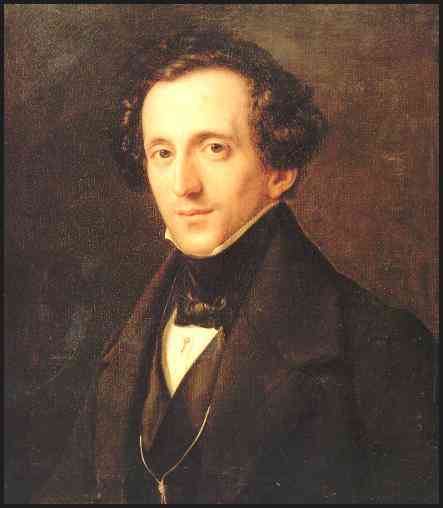Jakob Ludwig Felix Mendelssohn Bartholdy (3 February 1809 – 4 November 1847), born and widely known as Felix Mendelssohn,was a German composer, pianist, organist and conductor of the early Romantic period.
A grandson of the philosopher Moses Mendelssohn, Felix Mendelssohn was born into a prominent Jewish family, although initially he was raised without religion and was later baptised as a Reformed Christian. Mendelssohn was recognised early as a musical prodigy, but his parents were cautious and did not seek to capitalise on his talent.
Early success in Germany, where he also revived interest in the music of Johann Sebastian Bach, was followed by travel throughout Europe. Mendelssohn was particularly well received in Britain as a composer, conductor and soloist, and his ten visits there – during which many of his major works were premiered – form an important part of his adult career. His essentially conservative musical tastes, however, set him apart from many of his more adventurous musical contemporaries such as Franz Liszt, Richard Wagner and Hector Berlioz. The Leipzig Conservatoire (now the University of Music and Theatre Leipzig), which he founded, became a bastion of this anti-radical outlook.
Mendelssohn wrote symphonies, concerti, oratorios, piano music and chamber music. His best-known works include his Overture and incidental music for A Midsummer Night's Dream, the Italian Symphony, the Scottish Symphony, the overture The Hebrides, his mature Violin Concerto, and his String Octet. His Songs Without Words are his most famous solo piano compositions. After a long period of relative denigration due to changing musical tastes and anti-Semitism in the late 19th and early 20th centuries, his creative originality has now been recognised and re-evaluated. He is now among the most popular composers of the Romantic era.
The concert overture The Hebrides (German: Die Hebriden), Op. 26, also known as Fingal's Cave (Die Fingalshöhle), was composed by Felix Mendelssohn in 1830. The piece was inspired by a cavern known as Fingal's Cave on Staffa, an island in the Hebrides archipelago located off the west coast of Scotland. As is common with Romantic era pieces, this is not an overture in the sense that it precedes a play or opera; the piece is a concert overture, a stand-alone musical selection, and has now become part of standard orchestral repertoire. The piece was dedicated to King Frederick William IV of Prussia (then Crown Prince of Prussia).
The Symphony No. 4 in A major, Op. 90, commonly known as the Italian, is an orchestral symphony written by German composer Felix Mendelssohn.
The work has its origins, like the composer's Scottish Symphony and the orchestral overture The Hebrides (Fingal's Cave), in the tour of Europe which occupied Mendelssohn from 1829 to 1831. Its inspiration is the colour and atmosphere of Italy, where Mendelssohn made sketches but left the work incomplete.The Italian Symphony was finished in Berlin, 13 March 1833, in response to an invitation for a symphony from the London (now Royal) Philharmonic Society; he conducted the first performance himself in London on 13 May 1833, at a London Philharmonic Society concert. The symphony's success, and Mendelssohn's popularity, influenced the course of British music for the rest of the century.However, Mendelssohn remained unsatisfied with the composition, which cost him, he said, some of the bitterest moments of his career; he revised it in 1834 and even planned to write alternate versions of the second, third, and fourth movements. He never published the symphony, and it appeared in print only in 1851; thus it is numbered as his 'Symphony No. 4', although it was in fact the third in order of composition.

